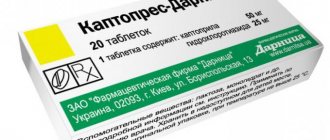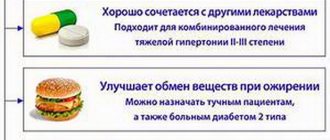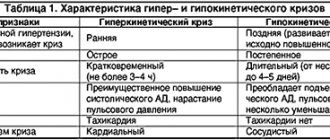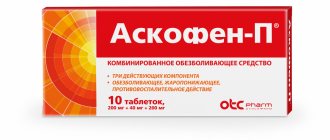pharmachologic effect
Papaverine hydrochloride is a myotropic antispasmodic agent. Reduces the tone and reduces the contractile activity of smooth muscles and therefore has a vasodilator and antispasmodic effect. Causes dilation of arteries, increases blood flow, incl. cerebral. When used in average therapeutic doses, papaverine hydrochloride has virtually no effect on the central nervous system. In large doses, it reduces the excitability of the heart muscle and slows down intracardiac conduction. It is an inhibitor of the phosphodiesterase enzyme and causes intracellular accumulation of cyclic 3,5-adenosine monophosphate, which leads to impaired contractility of smooth muscles and their relaxation during spastic conditions.
Papaverine: what is this medicine for?
According to its purpose, Papaverine is a widely used antispasmodic. Once in the body, the drug can not only relieve spasm of smooth muscles, but also relax the blood vessels, allowing them to expand, and also relieve spasm from the respiratory organs, for example, from the bronchi. As a result, blood circulation improves and tissues receive more oxygen. Special doses of the drug can reduce cardiac excitability and affect the central nervous system.
Indications for the use of Papaverine are:
- Pain due to inflammation of the gallbladder associated with spasm of the ducts, which prevents the passage of bile, which becomes the root cause of the formation of stones.
- Contraction of the gastric pylorus, which prevents food from entering the duodenum from the stomach.
- Bronchospasm of various etiologies.
- Spasms of blood vessels, including the brain.
- Angina pectoris (as a complex therapy).
Papaverine may be prescribed before certain types of surgery to prevent abdominal cramping.
Contraindications
Hypersensitivity, coma, respiratory depression, atrioventricular conduction disorder, glaucoma, liver dysfunction, old age (risk of hyperthermia), children's age (up to 1 year).
Carefully
The drug should be prescribed with caution and in small doses to elderly and debilitated patients, as well as patients with traumatic brain injury, impaired renal function, hypothyroidism, adrenal insufficiency, prostatic hypertrophy, as well as patients with supraventricular tachycardia and those in a state of shock.
Papaverine suppositories during pregnancy: where to insert
In gynecology, Papaverine is often prescribed to pregnant women who complain of nagging pain in the lower abdomen. If the obstetrician confirms increased uterine tone, a threat of miscarriage is suspected, and therefore there is a need to relax the walls of the uterus. Papaverine is suitable for this. In certain doses, it allows you to eliminate the threat of miscarriage and bring the baby to term.
The drug, produced in the form of suppositories, is intended for rectal administration. Despite the fact that the effect of the drug is expected in the uterus, suppositories must be inserted into the rectum. Once in it, Papaverine will quickly be absorbed into the bloodstream and give the desired effect.
Directions for use and doses
The drug is administered subcutaneously, intramuscularly and intravenously. 1-2 ml of solution is injected subcutaneously and intramuscularly 2-4 times a day. Intravenously - 1 - 2 ml of a 2% solution with preliminary dilution in 10-20 ml of isotonic sodium chloride solution. It should be administered very slowly and carefully, given that the drug can cause the development of atrioventricular block, ventricular extrasystoles and ventricular fibrillation.
A single dose for adults is 0.02-0.04 g (1-2 ml of 2% solution); the interval between administrations is at least 4 hours. For elderly patients, the initial single dose should not exceed 0.01 g. For children from 1 year to 12 years, the maximum single dose is 0.3 mg/kg body weight.
Use in pregnant and lactating women
During pregnancy, Papaverine injection solution is used very rarely, only if there are serious indications for it. Injections are given under the strict supervision of a doctor. Most often, expectant mothers are prescribed Papaverine in the form of rectal suppositories to relieve uterine hypertonicity.
During breastfeeding, Papaverine injections are given under the supervision of a doctor. Studies have not revealed any negative effects on infants, however, self-medication is contraindicated; the drug must be prescribed by a doctor.
Side effect
Allergic reactions, nausea, drowsiness, decreased blood pressure, constipation, increased transaminase levels in the blood, eosinophilia, and increased sweating are possible. With rapid intravenous administration, as well as with high doses, atrioventricular block and heart rhythm disturbances may develop.
Overdose
Symptoms: blurred vision (double vision), weakness, drowsiness, hypotension. Treatment: gastric lavage (milk, activated carbon), maintaining blood pressure.
Papaverine for tone: how many times a day
Depending on the condition of the pregnant woman, two schemes for using suppositories with papaverine can be prescribed:
- Use the drug strictly at night for 5 days in a row. A one-time dose is acceptable in situations where the tone of the uterus increases only from time to time.
- With constant tone, 3 doses are prescribed during the day. Preferably in the morning, after bowel movements, during the day and before bedtime. The duration of administration according to this regimen can only be regulated by a doctor.
Why papaverine injections?
In addition to tablets and suppositories, there is also a dosage form in the form of a solution for intravenous or intramuscular administration. This method of delivering medicine to the body is used when there is no time to wait for the drug to be absorbed through the gastrointestinal tract. Among these patients are pregnant women. They may be prescribed Papaverine by drip method. While staying in hospital for preservation, women receive regular doses of Papaverine, and the result can be monitored by an obstetrician in order to promptly make adjustments to therapy if necessary.
Is it possible to insert papaverine for hemorrhoids?
Hemorrhoids are varicose veins of the rectum. Lumps that form on the veins make it difficult for stool to pass through, causing discomfort and even pain during bowel movements. Thanks to Papaverine, it is possible to achieve relaxation of the intestinal muscles, which greatly facilitates bowel movements. In the initial stages of hemorrhoids, Papaverine is an excellent remedy to prevent the problem from worsening. In addition, the drug is often prescribed for constipation, as suppositories have a laxative effect.
Is it possible to drink papaverine during menstruation?
Periodic female pain associated with menstruation occurs due to contractions of the uterine muscles. This is how the organ gets rid of the overgrown endometrium, which was lined throughout the entire cycle, awaiting the attachment of the fertilized egg. Due to the absence of a fertilized egg, at the beginning of the cycle the level of hormones in the body changes, which causes emptying of the uterine cavity. For better rejection, the organ contracts, which causes severe pain in women. Papaverine, acting on smooth muscles, relieves pain and dilates blood vessels, which facilitates the release of blood clots. Papaverine is taken during menstruation according to two different schemes:
- if menstruation is always painful, you are allowed to take 1 tablet three times a day during the first three days of the cycle.
- If menstruation is usually painless, with occasional cramps, there is no need to take the drug as a course, a single dose is enough to stop the attack. If necessary, the dose can be repeated, but not earlier than 4 hours after the first use.
Papaverine hydrochloride solution for injection 20 mg/ml in ampoules 2 ml No. 10
Name
Papaverine ghl solution dimin. 20 mgml in amp. 2 ml in pack No. 10
Description
Transparent liquid with a slight yellowish tint.
Compound
One ampoule (2 ml) contains: active substance - papaverine hydrochloride - 40 mg, excipients: DL-methionine, disodium edetate, water for injection.
Pharmacotherapeutic group
Drugs for the treatment of functional disorders of the gastrointestinal tract (GIT). Papaverine and its derivatives. ATX code – A03AD01.
Pharmacological properties
Pharmacodynamics Papaverine hydrochloride has a hypotensive and antispasmodic effect. The mechanism of action is associated with the ability of papaverine hydrochloride to block the activity of type IV phosphodiesterase. Blockade of the enzyme leads to the cessation of cAMP hydrolysis and an increase in its concentration in the smooth muscle cells of blood vessels and internal organs; cAMP limits the flow of calcium ions into the muscle cell and inactivates myosin light chain kinase, a contractile protein that ensures muscle contraction. Papaverine hydrochloride reduces the tone and relaxes the smooth muscles of internal organs (gastrointestinal tract, respiratory tract, genitourinary system) and blood vessels. Papaverine hydrochloride dilates mainly arterial vessels and increases blood flow, including cerebral one. Pharmacokinetics After subcutaneous and intramuscular administration, it is quickly and completely absorbed. Therapeutically effective concentrations of the drug in plasma are 0.2-2.0 mcg/ml. With repeated use of the drug, its pharmacokinetics do not change. Binds to plasma proteins by 90%. Easily passes through histohematic barriers. Forms a depot in the liver and adipose tissue. Subject to biotransformation in the liver. The half-life of papaverine hydrochloride (T?) is 0.5-2.0 hours. It is excreted in the form of metabolites in the urine, in small amounts (less than 0.5%) unchanged.
Indications for use
- prevention and relief of spasms of smooth muscles of internal organs during cholecystitis, spastic colitis, pyloric spasm;
- relief of biliary and renal colic;
- treatment of obliterating endarteritis, spasms of blood vessels in the brain and limbs (as part of complex therapy).
Contraindications
- children under 1 year of age;
- respiratory depression or coma;
- atriventricular (AV) block;
- hypersensitivity to papaverine or any of the excipients included in the drug;
- glaucoma;
- age over 75 years (risk of hyperthermia);
- heart failure, myocardial infarction (acute and recent), heart rhythm disturbances (bradycardia);
- intracranial hypertension;
- liver diseases.
Directions for use and doses
The drug is used subcutaneously, intramuscularly and intravenously. Adults and children over 14 years of age are administered subcutaneously and intramuscularly with 0.5-2 ml (10-40 mg) of a 20 mg/ml solution, and intravenously administered very slowly, at a rate of 3-5 ml/min, dissolving 1 ml 20 mg/ml solution of papaverine hydrochloride (20 mg) in 10-20 ml of 0.9% sodium chloride solution. The most effective is intravenous administration. For elderly patients, a single dose at the beginning of treatment should not exceed 10 mg (0.5 ml of a 20 mg/ml solution). Maximum doses for adults for subcutaneous or intramuscular administration: single - 100 mg (5 ml of 20 mg/ml solution), daily - 300 mg (15 ml of 20 mg/ml solution); for intravenous administration: single dose - 20 mg (1 ml of 20 mg/ml solution), daily - 120 mg (6 ml of 20 mg/ml solution). For children aged 1 to 14 years, the drug is used 2-3 times a day. A single dose is 0.7-1 mg/kg body weight. The maximum daily dose for children is (regardless of the route of administration): at the age of 1-2 years - 20 mg (1 ml of 20 mg/ml solution), 3-4 years - 30 mg (1.5 ml of 20 mg/ml solution), 5-6 years - 40 mg (2 ml of 20 mg/ml solution), 7-9 years - 60 mg (3 ml of 20 mg/ml solution), 10 -14 years -100 mg (5 ml of 20 mg/ml solution).
Side effect
The frequency is classified depending on the occurrence of the case: very often (? 1/10), often (
Pregnancy and lactation
During pregnancy and breastfeeding, the drug is recommended to be used only if the expected benefit to the mother outweighs the potential risk to the fetus/child.
Use in pediatrics
The use of papaverine hydrochloride in children under 1 year of age is not recommended due to the high risk of developing hyperthermia. Intravenous administration of the drug in children under 15 years of age is not recommended.
Extra Caution
Caution should be exercised and only small doses of papaverine hydrochloride should be used in persons with traumatic brain injury, impaired liver and kidney function, hypothyroidism, and adrenal insufficiency, since the hypotensive effect of papaverine hydrochloride is enhanced in them. In persons with benign prostatic hyperplasia, high doses of papaverine hydrochloride can provoke the development of acute urinary retention. Rapid intravenous administration can lead to fatal arrhythmias and apnea. It is advisable to monitor ECG before and during parenteral treatment. Caution should be exercised if there is a history of cardiac conduction disorders or decompensated cardiovascular disease due to the risk of cardiac arrhythmias. Administration of papaverine hydrochloride should be discontinued if symptoms of liver toxicity occur. Papaverine hydrochloride should be prescribed with caution to patients with decreased gastrointestinal motility due to the greater susceptibility of these patients to impaired digestive function.
Impact on the ability to drive vehicles and operate machinery
When driving vehicles and operating machinery, caution must be exercised due to the possible development of side effects when taking papaverine hydrochloride, such as drowsiness and dizziness.
Interaction with other drugs
With simultaneous use of papaverine hydrochloride, it potentiates the effect of alcohol and weakens the hypotensive effect of methyldopa. In smokers, the metabolism of papaverine hydrochloride is accelerated, and its concentration in the blood plasma and pharmacological effects are reduced. Nicotine may reduce or completely eliminate the vasodilating effect of papaverine hydrochloride. Phentolamine potentiates the effect of papaverine hydrochloride on the cavernous bodies of the penis when administered together. Diphenhydramine (diphenhydramine), metamizole (analgin) and diclofenac potentiate the antispasmodic effect of papaverine hydrochloride. Solutions of papaverine hydrochloride are pharmaceutically incompatible with glucose solutions (partial inactivation of papaverine hydrochloride). Papaverine hydrochloride may weaken the therapeutic effect of levodopa (antiparkinsonian drugs). Papaverine hydrochloride may enhance the effect of calcium channel blockers. When used together with antiarrhythmic and antihypertensive drugs, the hypotensive effect may be enhanced. Papaverine hydrochloride may enhance the effect of drugs that depress the central nervous system and exhibit synergism in combination with morphine.
Overdose
Symptoms of intoxication appear when high doses are administered, especially against the background of liver and kidney pathology. Characterized by the appearance of diplopia, weakness, drowsiness, hypotension, cardiac arrhythmia and tachycardia. There is no specific antidote. Helpful measures include discontinuation of the drug, gastric lavage, administration of activated charcoal, and maintenance and symptomatic therapy aimed at eliminating the disorders that have arisen.
Package
2 ml in glass ampoules.
- 10 ampoules along with the package insert are placed in a cardboard box (No. 10);
- 10 ampoules together with a leaflet are placed in a cardboard pack with a cardboard insert for fixing the ampoules (No. 10);
- 10 ampoules in a polyvinyl chloride film insert; 1 insert together with the insert leaflet is placed in a cardboard pack (No. 10x1).
Storage conditions
In a place protected from light, at a temperature not exceeding 25? C. Keep out of the reach of children.
Best before date
3 years. Do not use the medicine after the expiration date indicated on the packaging.
Conditions for dispensing from pharmacies
On prescription.







